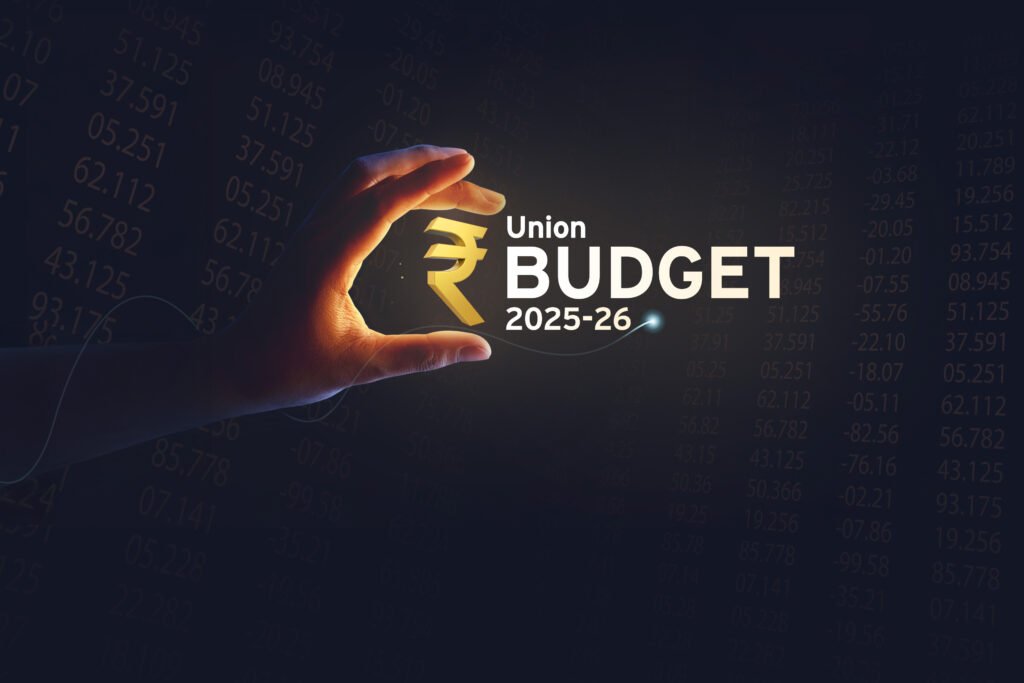
Introduction
A forward-looking blueprint centered on tax relief, corporate empowerment, and long-term growth through digital and green initiatives is outlined in the Union Budget 2025, which was delivered by Finance Minister Nirmala Sitharaman. This budget seeks to strike a balance between inclusive development and fiscal efficiency by implementing significant reforms targeted at the middle class, MSMEs, startups, and developing industries. The most significant changes made in the India Budget 2025 are outlined below, along with their implications for businesses and taxpayers.
Personal Income Tax Changes
The Union Budget 2025’s overhaul of the personal income tax system is one of its main features. A full tax refund on income up to ₹12 lakh, a substantial increase from the previous ₹7 lakh level, will be available to taxpayers who choose the new system.
| Income Range | Tax Rate (New Regime) |
| ₹0 – ₹4 lakh | 0% |
| ₹4 lakh – ₹8 lakh | 5% |
| ₹8 lakh – ₹12 lakh | 10% |
| ₹12 lakh – ₹24 lakh | 15% |
| Above ₹24 lakh | 30% |
Full tax rebate on income up to ₹12 lakh under the new tax regime.
Standard deduction raised from ₹50,000 to ₹75,000.
TDS threshold for senior citizens increased to ₹1 lakh on interest income.
Implications:
More take-home income for salaried individuals.
Simplified tax planning under the new regime.
Encouragement for taxpayers to switch from the old regime.
MSME and Startup Incentives
The budget brings a strong focus on supporting MSMEs and startups, seen as key drivers of employment and innovation. The Credit Guarantee Scheme for MSMEs has been enhanced, doubling the guarantee limit to ₹10 crore. This is expected to ease access to working capital and encourage business expansion. For startups, tax exemptions and other incentives have been extended until April 1, 2030, allowing them a longer runway for scaling. The government has also relaxed angel tax provisions to encourage private investment and improve the funding ecosystem. Moreover, a centralized digital portal is being introduced to help MSMEs with registration, compliance, and grievance redressal. These moves reflect a policy shift towards building a self-reliant entrepreneurial ecosystem.
Compliance and Filing Reforms
In a bid to make tax compliance easier and more transparent, the Budget 2025 introduces several procedural reforms. The window for filing updated income tax returns has been extended from two to four years, giving taxpayers more flexibility to correct errors or omissions. Additionally, TDS and TCS thresholds have been increased to reduce unnecessary deductions—rent payments up to ₹6 lakh and dividend income up to ₹10,000 will now be exempt from TDS. Another important development is the upgrade of the income tax filing portal, which now features AI-powered checks, real-time feedback, and guided filing assistance. These reforms aim to reduce the compliance burden, minimize litigation, and create a more taxpayer-friendly system.
Business Taxation and Sectoral Boosts
While the corporate tax rates have been kept unchanged to maintain stability, the government has introduced targeted incentives for specific industries. Customs duties have been rationalized on key imports like electronic components, electric vehicle (EV) parts, and medical devices, to promote domestic manufacturing under the Make in India initiative. Several sectors received focused support. The textile industry, regional aviation (under UDAN 2.0), and tourism were all granted new incentives and Production Linked Incentive (PLI) expansions. These changes are expected to enhance competitiveness, drive exports, and generate employment in key labor-intensive sectors.
Green and Digital Economy Initiatives
A major thrust of the Union Budget 2025 lies in strengthening India’s green and digital future. An allocation of ₹26,500 crore has been earmarked for renewable energy and EV infrastructure. Tax incentives have also been extended to startups and companies involved in green technologies, such as solar panel manufacturing, battery storage, and hydrogen fuel development. The government also announced the India AI Mission, with a budget of ₹10,000 crore to boost research and development in artificial intelligence. New AI Centres of Excellence will be established across Tier 1 and Tier 2 cities to democratize access to AI tools and training. These initiatives mark a long-term commitment to sustainability and digital transformation, opening up new opportunities for businesses and investors in emerging sectors.
Conclusion with Expert Insight
The Union Budget 2025 offers a well-balanced combination of economic stimulus, tax rationalization, and future-focused investments. For individual taxpayers, the revised income tax slabs and enhanced standard deduction offer significant relief and simpler filing. MSMEs and startups stand to benefit from easier credit access, reduced compliance, and extended tax holidays, while businesses across key sectors are set to gain from custom duty revisions and PLI incentives. From a Chartered Accountant’s perspective, this budget encourages proactive financial planning, especially under the revised income tax regime 2025. It’s also a signal for businesses to align themselves with upcoming regulatory trends in sustainability, digitization, and compliance. Final Thought: Whether you’re an individual taxpayer, a small business owner, or an entrepreneur, now is the time to revisit your tax strategy and take full advantage of the new benefits and reforms introduced in India Budget 2025.
